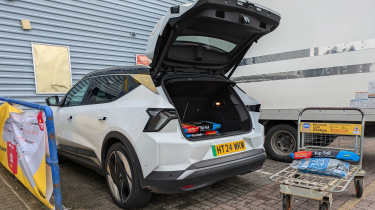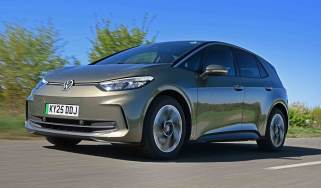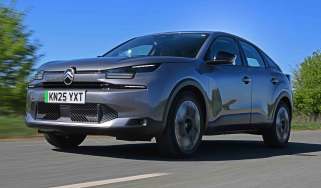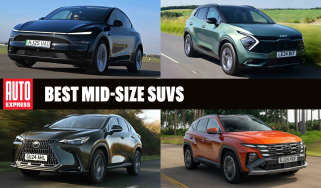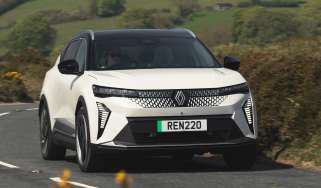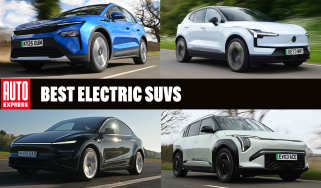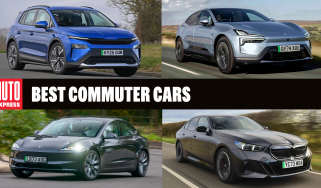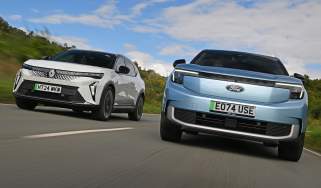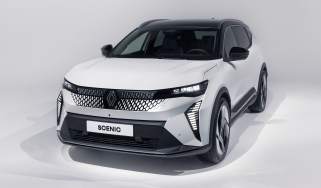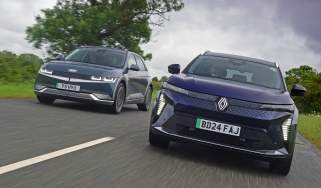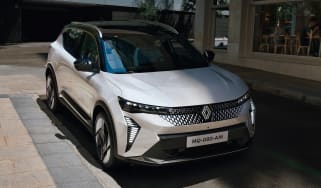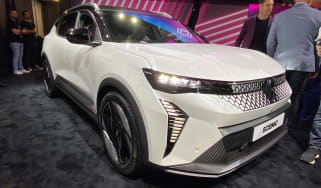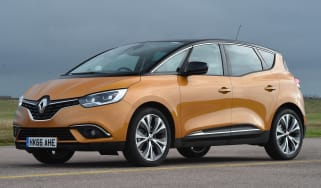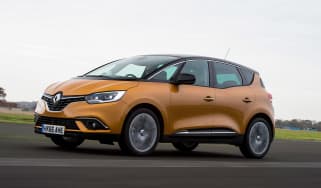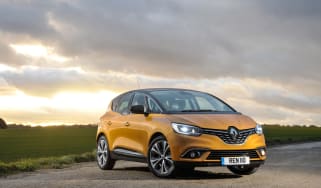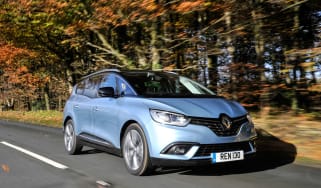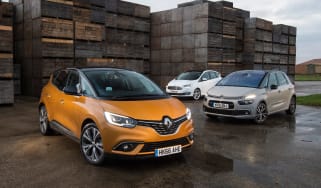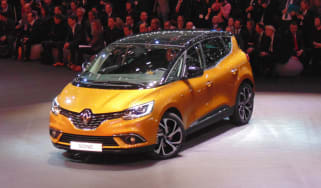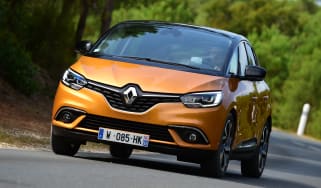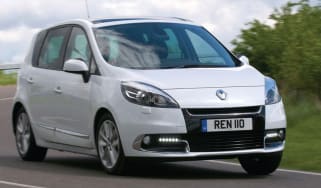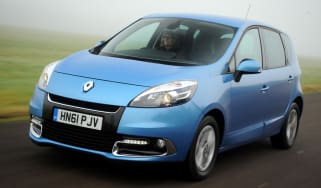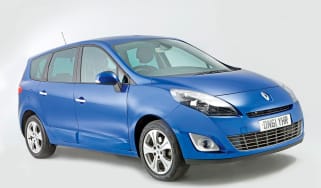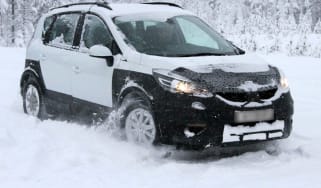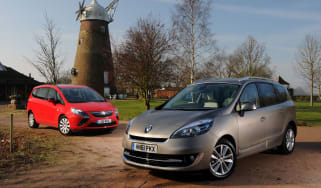Renault Scenic review
The electric Renault Scenic is an innovative and hi-tech car with sustainable features

Is the Renault Scenic a good car?
The Renault Scenic E-Tech is one of six SUVs that are offered by the French company, but it stands out by only being available with an all-electric powertrain. It shares its running gear with the Mégane E-Tech, yet as with previous Scenics, it’s larger overall, while the SUV-style body provides a more versatile, family-friendly interior.
Every Scenic gets a sizeable 87kWh battery fitted, and there are three trim levels available: Techno, Techno Esprit Alpine, and Iconic Esprit Alpine. Competitive pricing and generous equipment levels mean the Scenic offers good value for money when compared with its rivals, even in top-spec Iconic Esprit Alpine guise.
| Key specs | |
| Fuel type | Electric |
| Body style | Five-door SUV |
| Powertrain | 87kWh battery, 1x e-motor, front-wheel drive |
| Safety | 5-star EuroNCAP (based on the Renault Megane results from 2022) |
| Warranty | 3yrs/100,000 miles |
How much does the Renault Scenic cost?
While the Renault Scenic uses a name from the French firm’s past, there’s nothing dated about the current E-Tech model. Using older names is a growing trend for new EVs, with Renault also using the 5 and Mégane badges for its electric models, while Ford has also hit the headlines with its retro-badged machines.
The old Scenic was a family-friendly MPV that sold in big numbers across Europe and the UK. However, the E-Tech follows an electric SUV template, although Renault is keen to pitch it more as a family-friendly model like its ancestors – it just happens to be powered purely by electricity.
Used - available now

2022 Kia
Rio
16,781 milesAutomaticPetrol1.0L
Cash £14,689
2021 Suzuki
Swace
23,573 milesAutomaticPetrol1.8L
Cash £17,250
2017 Mercedes
E-Class Coupe
68,480 milesAutomaticDiesel2.1L
Cash £13,139
2020 Peugeot
308
69,461 milesManualPetrol1.2L
Cash £7,795Unsurprisingly, the Scenic E-Tech is more expensive than the last internal-combustion-engined Scenic MPV, with the entry-level Techno variant starting at just over £37,000. Two more trim levels, Techno Esprit Alpine and Iconic Esprit Alpine, are also available.
As part of a pricing and trim level restructuring, the smaller 60kWh battery size had been dropped, leaving the 87kWh battery as the only size offered. Upgrading to the mid-range Techno Esprit Alpine will cost you just shy of £40,000, while the top-of-the-range Iconic Esprit Alpine comes in at around £42,000. All versions have had a dramatic price cut relative to their equivalent predecessor, making them even better value compared with rivals than they were before. There isn’t much extra to pay on top of these list prices, either, because there aren’t any options offered – even the six different paint options don’t cost extra.
The base model is still generously equipped, with 19-inch diamond-cut alloys, front and rear LED lights, a 12.3-inch driver’s display and 12-inch central screen, dual-zone climate control, heated front seats and steering wheel, wireless smartphone connectivity and charging, plus a rear camera.
Moving up to the Techno Esprit Alpine adds 20-inch wheels, sports seats, ‘Esprit Alpine’ badging on both the exterior and interior, a fabric grey dash, electrically adjustable front seats and blue cabin accents.
The plush Iconic Esprit Alpine has an uprated Harman Kardon sound system, hands-free parking, a 360-degree camera system, a digital rear-view camera and a panoramic glass roof. Perhaps most importantly for UK-based EV drivers, a heat pump is fitted as standard on all models.
Electric motor, performance & drive
Due to the smaller battery version being dropped from the Renault Scenic range, all models going forward come with an 87kWh battery and a 215bhp electric motor providing 300Nm of torque. Unlike its Nissan Ariya sibling, the Scenic is front-wheel drive only, which may be an issue for some who live in remote areas of the country susceptible to snow and ice in the winter and are looking for a Scenic with four-wheel drive. Renault has yet to add a four-wheel-drive option to any of its electric models.
| Model | Power | 0-62mph | Top speed |
| Renault Scenic Techno 87kWh | 215bhp | 7.9sec | 105mph |
What is the Renault Scenic like to drive?
There’s a sporty edge to the Scenic courtesy of its firm ride and fast steering, but it’s not a particularly agile car to drive.
In town
Light steering with a quick rack boosts the Scenic’s manoeuvrability at low speeds, but this is offset by a lack of all-round visibility. You sit low compared with some rival electric SUVs, while the rear window is narrow and the view is obscured by the large headrests in the back.
For those reasons, we’d recommend the top-spec Iconic Eprit Alpine model, because it comes with a 360-degree camera system and digital rear-view mirror, although this can be switched off if you prefer glass. All models in the line-up feature front and rear parking sensors.
The 215bhp electric motor offers reasonable responses away from the lights, but there isn’t the typical punch in the back that a lot of electric vehicles deliver. The Scenic now comes with a one-pedal drive mode like its Nissan Ariya sibling as part of the model range revisions. That means you can fully utilise the regenerative braking in stop-start traffic without needing to touch the brakes, making it a little more relaxing in town and helping to boost your overall efficiency and range.
On A- and B-roads
At motorway speeds, you’re aware that the Renault’s steering is relatively quick around the dead-ahead position and requires constant attention to ensure the car is tracking straight. This gives the impression that the Scenic has a sporty edge, but while the ride is on the firm side, that’s more to do with keeping the car’s weight in check than trying to deliver an engaging drive.
A sub-two-tonne kerbweight doesn’t sound all that special, yet in the world of electric SUVs the Scenic is one of the lighter models on sale. This helps with its responses, but there’s still some body roll in corners, while the firm suspension shudders over bumps that rivals can absorb easily. Some of that can be blamed on the 20-inch wheels that are standard on high-spec variants.
While the car’s power delivery isn’t as forceful as in some EVs, the Scenic’s front-wheel-drive set-up can still struggle to get it down, especially if you’re exiting a corner, when the inside wheel will break traction. Wheel-tugging torque steer is also an issue if you feed all of the power in at once.
On the motorway
Refinement at motorway speeds is good, and wind noise is reduced on top-spec Iconic models courtesy of standard-fit acoustic glass. There is some tyre roar to be heard instead, though.
0-62mph acceleration and top speed
Every Scenic comes with a 215bhp electric motor, allowing for a 0-62mph sprint in 7.9 seconds. Its top speed of 105mph is faster than a number of EVs, although you'll have to go abroad to find a road where it's legal to drive that fast, and it won't do your driving range any favours to travel at that speed.
Range, charging & running costs
Electric range, battery life and charge time
Renault quotes a WLTP range of up to 381 miles in Techno trim, dropping to 372 miles in mid-range Techno Esprit Alpine, and 369 miles for the top-of-the-range Iconic Esprit Alpine.
During our tests with the Scenic, we’ve seen an efficiency figure of around 3.4 miles per kWh, while our long-term test car has posted returns as low as 3.1 mi/kWh in cool conditions. However, cold weather shouldn’t have much of an impact on the Scenic’s range, because all versions are fitted with an energy-saving heat pump as standard.
The maximum DC charging rate for the 87kWh battery pack is 150kW from a DC source. That means a 15-80 per cent top-up charging time of 37 minutes, which is a little more than it takes in some rivals, which can fast-charge to the same capacity in less than half an hour, or just 18 minutes in the case of the Hyundai Ioniq 5 or Kia EV6.
The Scenic also supports three-phase charging, and a 22kW source can take the larger unit from flat to fully topped up in just under five hours. The smaller battery takes three-and-a-quarter hours to do the same. Utilise a typical 7kW home wallbox charger and it'll take around 13 hours to fully recharge a Scenic.
| Model | Battery size | Range | Insurance group |
| Renault Scenic Techno 87kWh | 87kWh | 381 miles | 33E |
| Renault Scenic Iconic Esprit Alpine 87kWh | 87kWh | 369 miles | 34E |
Tax
The lowest Benefit-in-Kind (BiK) rate for EVs applies to the Scenic, and company car drivers will make savings over similarly specced rivals, courtesy of Renault’s competitive P11D costs.
Electric cars are no longer exempt from yearly Vehicle Excise Duty road tax, but both the entry-level Techno and Techno Esprit Alpine slip under the £40,000 threshold and avoid the additional luxury car tax. The top-of-the-range Iconic Esprit Alpine falls foul of this, so you'll need to pay the supplementary fee from the second year the vehicle is taxed until it is six years old. You can still enter the London Congestion Charge area until 24 December 2025 without being charged, though.
Insurance groups
The entry-level Scenic starts in group 33, and goes up to group 34 for the priciest Iconic Esprit Alpine.
Depreciation
Residual values for the Renault Scenic fall within the 53 to 55 per cent range after three years/36,000 miles, which is near the upper end of the electric SUV spectrum. In comparison, the platform-sharing Nissan Ariya has residuals of between 43 to 50 per cent over the same period.
To get an accurate valuation for a specific model, check out our free car valuation tool...
Interior, design & technology
The exterior of the Renault Scenic taps into the themes of the Scenic Vision concept of 2022, designed by Gillas Vidal. The light units front and rear adopt an aggressive and bold design, and unlike the black-painted concept, the lighter colours available on the Scenic show up the car’s sharp surfacing very well. The selection of alloy wheel designs is interesting.
As with the old Scenic people carrier, the latest electric SUV shares tech with the Mégane, but adds more space into the mix.
What is the Renault Scenic like inside?
Renault’s latest corporate look includes plenty of sharp angles and slender lights, and the Scenic mixes these with SUV proportions to cut a real dash on the road.
The angular theme continues inside, where the upright dashboard, with a portrait touchscreen and landscape driver’s display, dominates. There’s a decent mix of materials, though, with light-coloured seat fabrics and white armrests breaking up the black.
What is the interior quality like?
Different types of plastic are used throughout the cabin, with traditional hard, black trim on the lower doors and the centre console, and softer materials on the dashtop and upper doors.
The lighter parts feel good to touch, while the upholstery is made from recycled fabrics and is an acceptable substitute for leather, which isn’t even offered as an option.
Even the steering wheel is trimmed in synthetic material, although it feels like soft leather in your hands. One minor gripe is with the driver’s air vent, which is of a different design to the others on the dashboard, and feels a little clunky to use.
Sat-nav, stereo and infotainment
The two large displays on the dashboard feature super-sharp graphics and neat animations, while there’s plenty of information on the driver’s display. This can be configured into different layouts, although we’d recommend choosing one and sticking to it, because switching from one to another can shuffle the layout around, leaving vital information such as your speed in a different position that makes it hard to pick out. There are various colour themes offered, while the shortcut toggle switches beneath the main display are handy.
Renault’s OpenR Link system runs on a 12-inch portrait display in the Scenic and features crisp graphics, while the Google operating system is familiar from other recent Renaults. It’s quick to load, and the standard Google Maps software is just as effective as the firm’s smartphone app at rerouting to avoid traffic.
There are shortcut keys at the top of the main display to make navigating the system easier, while the climate controls use a mix of quick-access physical buttons and more in-depth touchscreen functions.
Top-spec Iconic cars are fitted with what Renault calls its Solarbay roof. This is a panoramic glass panel that incorporates an electrochromatic layer that can turn from clear to opaque at the push of a button. It transforms in steps front to rear, which is a neat show for back-seat occupants to watch.
Fitting a digital rear-view mirror is a useful addition because it overcomes poor rear visibility, but not everybody can get along with this type of set-up. If you need to wear corrective glasses, it can be tricky to refocus on the screen rather than looking into a conventional mirror. At least it’s switchable here. Some cars have the camera for the digital mirror mounted on the roof or tailgate, but the Scenic’s is behind the rear window. Here it can mist up, and you need to use the rear wiper to keep it clear of rain and dirt.
Renault requested the help of musician Jean-Michel Jarre to develop some sounds for the Scenic. The first is a ‘VSP’ (vehicle sound for pedestrians) that warns people when the car is approaching at speeds under 18mph, and the second is a welcome sound sequence when you turn the car on. Sadly for 1980s electronica fans, Jarre was not involved in developing the nine-speaker Harman Kardon sound system which is found as standard on the highest-specification Iconic trim.
Boot space, comfort & practicality
The Renault Scenic might have the same platform as the Renault Megane, but its wheelbase is 10cm longer than the Megane’s at 2,780mm, and it has a much wider track, so there’s enough space inside for a typical family. As in a lot of EVs, there’s a flat floor in the back and rear cabin space shouldn’t be an issue even for tall adults.
A central armrest features a pair of cup-holders, and there are stands that fold out to hold phones and tablets, plus a pair of USB-C charging sockets. We expect these will be used mostly by children, and with this in mind, they seemed reassuringly sturdy. There are also a load of useful storage compartments around the cabin with over 38 litres in total - including a large 6.6-litre area in the centre console.
| Dimensions | |
| Length | 4,470mm |
| Width | 1,864mm (2,085mm inc mirrors) |
| Height | 1,571mm |
| Number of seats | 5 |
| Boot space | 545-1,670 litres |
Dimensions and size
The Renault Scenic features a typical compact SUV shape, although it does have a lower roof than most rivals to help it cut through the air more effectively. The long wheelbase creates plenty of space inside, while the wide track also helps.
Seats & space in the front
There’s a wide range of seat and wheel adjustment, but longer-legged drivers might find their left knee makes contact with the protruding tray beneath the touchscreen, where the wireless phone-charging pad is located.
The centre armrest has 6.6 litres of space, while the glovebox isn’t spoiled by having the fusebox cutting into it. Flock-lined door bins are an upmarket touch that stops items rattling around inside.
Seats & space in the back
Headroom and legroom are fine in the back of the Scenic, but a lack of foot space under the front seats means there’s less room to stretch out. Combined with the low seat cushions, that means there isn’t much under-thigh support, so long trips could prove to be uncomfortable.
The middle seat is set quite high, but if you’re not using it, the backrest folds down to reveal a multifunction armrest. There are the usual cup-holders and some storage space, along with two smartphone cradles that can position devices where they can be easily viewed from the outer rear seats.
As with most family cars, you get two ISOFIX points located on the outer positions of the rear seat.
Boot space
There’s a bit of a load lip to negotiate to lift heavy items into the back of the Scenic, but the actual space on offer is generous, with a capacity of 545 litres in five-seat mode. This increases to 1,670 litres with the back seats folded, while the 40:20:40-split rear bench offers some useful versatility.
A deep under-floor area in the back of the Scenic will easily swallow two charging cables and still leave space for more, but there’s no storage in the car’s nose.
Towing
All versions of the Renault Scenic have a maximum braked towing capacity of 1,100kg. That’s above two-wheel drive versions of the Volkswagen ID.4, but behind the Kia EV6, which can pull a caravan or trailer of up to 1,800kg.
Safety & reliability
Renault has been a consistently strong performer in the Euro NCAP tests, and the Scenic earned a five-star rating in 2022. All trim levels feature a strong line-up of safety kit, including adaptive LED headlights, blind-spot warning and adaptive cruise control. The Iconic Esprit Alpine model adds some clever tech in the shape of 360-degree cameras and an automated hands-free parking system.
It’s compulsory for all new cars to feature electronic safety systems that reset to ‘on’ every time you climb aboard, and one of the most annoying can be the road-sign detection. One of the big tests for manufacturers these days is how easy it is to deactivate systems you feel are excessively intrusive, with their assorted warning beeps. In the Scenic this is simple, because a button to the right of the steering wheel deactivates the warning beeps, but still shows signs on the dash.
While the Renault Scenic is too new to have featured in our Driver Power customer satisfaction survey, Renault as a brand did not rank well in the recent scoring. The French firm came 29th out of 32 manufacturers.
| Key standard safety features | Euro NCAP safety ratings |
|
Warranty
The Scenic’s warranty of three years or 100,000 miles is a little above the industry average of three years/60,000 miles, and you get roadside assistance for the duration. In addition, the Scenic’s E-Tech powertrain has four years and 100,000 miles of cover, while the drive battery has cover for eight years and 100,000 miles.
Servicing
Buy a new Scenic, and Renault offers a monthly service plan that covers the car for three years and 48,000 miles. At around £12, it’s a couple of pounds less per month than a similar plan for a petrol-powered Clio. This simply goes to highlight the cheaper maintenance that EVs benefit from. There’s also a four year/48,000-mile service plan, and one that covers the car for four years or 60,000 miles. The latter two also include an MoT test and extended warranty.
The latest Renault Scenic requires servicing every two years or 18,000 miles, whichever comes first. In comparison, the Kia EV6 and Volkswagen ID.4 also need servicing every two years, but the EV6 can go 20,000 miles between visits, while the ID.4 will be popular with long-distance drivers because it has an unlimited-mileage policy.
Renault Scenic alternatives
The electric SUV class is packed with competition, including the big-selling Tesla Model Y, plus the Ford Explorer and Ford Capri, the Skoda Enyaq, Volkswagen ID.4, Toyota bZ4X, Kia EV6 and Hyundai Ioniq 5. Arguably the closest rival to the Scenic E-Tech is the Nissan Ariya, which uses the same running gear.
The big advantage that the Scenic has over these rivals is pricing. It offers nearly as much range as the Tesla or Fords, but has a bit more space, while being less expensive than any of them. Decent efficiency means it can travel further on a charge than the Toyota, and the onboard tech is more user-friendly than the systems in the VW Group models.
Renault Scenic Iconic Long Range long-term test
Our Head of digital content, Steve Walker, has been running a Renault Scenic Iconic Long Range for a long-term test. Having previously run a smaller Megane E-Tech, the additional space of the Scenic has been welcomed by his two children, who found the family’s past test car was a little cramped in the back in comparison.
It’s been a reasonably versatile family car during his ownership so far, although the high-loading lip and lack of variable-height boot floor have been a little bit of a pain. The jury is also still out on whether the light interior colour trim on his Iconic trim car will stand up to daily use. You can read the full long term test here...
Frequently Asked Questions
You get a three-year or 100,000-mile manufacturer's warranty like the rest of the Renault range, but the brand's electric range is also covered by a longer four-year or 100,000-mile policy for the electric motor, while the battery is covered to maintain 70 per cent of its original capacity for eight years or 100,000 miles.
